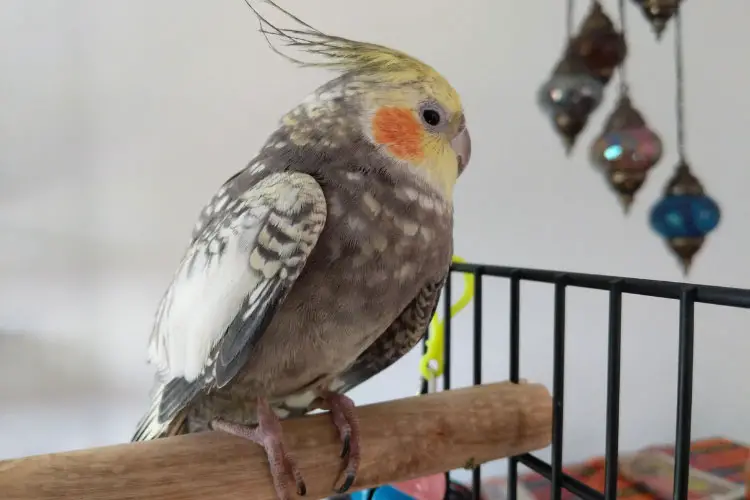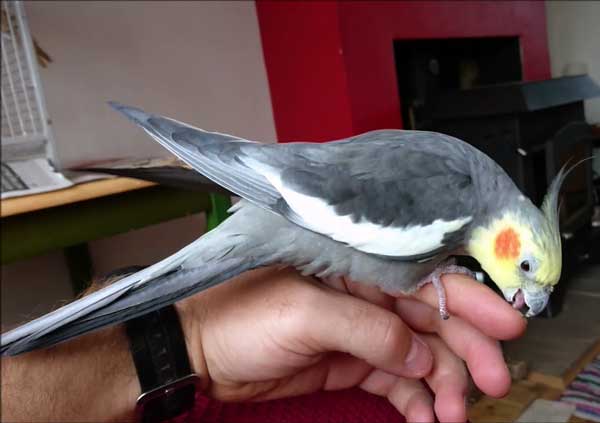Birds are not coprophagic, and they are not capable of gleaning nutrients from poop. Hence, one of the most undesirable behaviors of cockatiels is coprophagia. This is when the cockatiel eats its feces to obtain nutrients. So if you notice your pet bird eating poop, something is amiss.
Now, why do cockatiels eat their poop anyway? The primary reason cockatiels consume their feces is when they are deficient in specific nutrients from their diet. Alternatively, they may be under stress, consuming more calories than usual and compensating by consuming their feces. They may also be bored or attempting to clean their cage.
Another reason cockatiels eat poop is a lack of interaction. This article will also discuss some additional causes for this behavior. Fortunately, there are simple solutions to this problem, which will also be discussed in this article. Finally, we will discuss whether or not your cockatiel’s consumption of its feces has negative consequences.
Why Do Cockatiels Eat Their Poop?
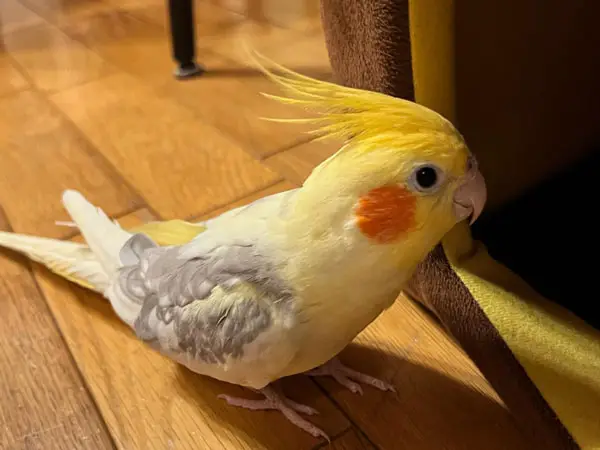
Cockatiels eat their poop for the following reasons:
1. Nutrient Deficiency
Among the parrot species, cockatiels are the best detectors of nutrients and vitamin deficiencies. Nutrient deficiency makes the cockatiel’s body unable to absorb the necessary vitamins and minerals. Apart from nutrient deficiency, the ability of the cockatiel’s body to absorb food is also influenced by the cockatiel’s stress levels, activity level, and health.
Likewise, if the nutrients are not absorbed in the cockatiel’s body, they are passed along with the feces. In addition, cockatiels can determine where they can obtain these missing nutrients, and one of the sources is their feces. Cockatiel feces contain amino acids, choline, Vitamin C, and Vitamin B.
Besides, coprophagia is also most frequently triggered by seed-based diets, leading to the desperate ingestion of feces. This is because seeds have high-fat content and lack nutritional value. Therefore, you should offer seeds as an occasional treat.
2. Boredom
When your cockatiel becomes bored, it will look for items to play with or, in this example, eat its feces. A bored cockatiel will entertain itself by consuming anything, including hair, perches, cage bars, and feces. Excessive consumption of these substances can lead to bowel issues and health problems that can lead to death.
On the other hand, eating feces is a coping method that continues despite a healthy diet. This also pertains to their natural behavior in the wild. When cockatiels remain in their nest for an extended period and are too exhausted to forage, they typically scavenge in their nest and consume anything they find.
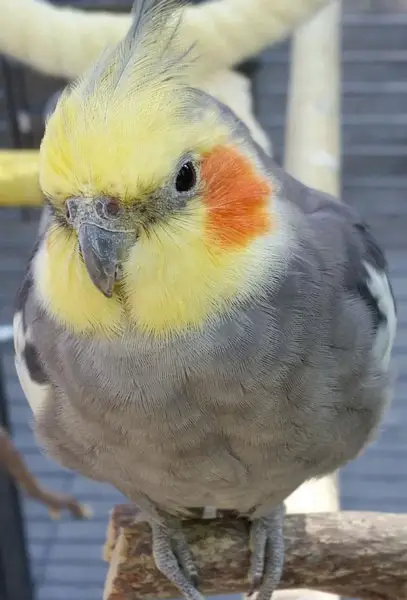
Also, cockatiels spend a great deal of time foraging in the wild. But in captivity, the food is served in a dish, which takes away the foraging norm. So, to satisfy their instinct, cockatiels will amuse themselves by foraging on the ground. That way, your cockatiel may consume feces from the bottom of its cage.
Keep in mind that boredom may appear negligible, but it is severe. Cockatiels are intelligent parrots who love socializing; they cannot tolerate a lack of mental stimulation.
3.Stress
A stressed cockatiel will spend more calories than a relaxed one. Why? Because factors such as abnormal heart rate, lack of sleep, or heightened vigilance can deplete your cockatiel’s energy more quickly. Also, stress makes the cockatiels pass the food at a faster rate. Their kidneys will excrete certain minerals, such as potassium, faster due to increased plasma proteins.
Thus, this high excretion rate will also lead to the loss of vitamin-soluble. So if the cockatiel does not compensate for the nutrients soon, it resorts to eating poop which contains the needed nutrients. Examine your cockatiel and its environment to determine the stressors, which might include;
- Loud noises or sudden movements
- Molting
- Changes in their environment
- Being in a new environment
- Presence of a pet or stranger
- Lack of sleep
- Boredom
4. Unclean Cage
Cockatiels love to live in a clean environment. So, if you do not regularly clean their cage, they will do it themselves. Cockatiels are intelligent enough to realize that their poop makes their environment unclean. So, to help keep things cleaner, your pet bird may consume the feces.
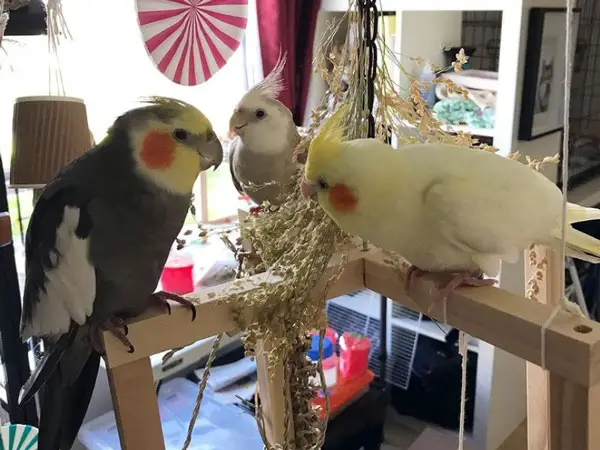
If this is the primary reason, your cockatiel is eating their feces. In that sense, cleaning the cage should be sufficient to stop them. Perform a small amount of cleaning each day and a more intensive cleansing at the end of the week.
5. Poop condition
Cockatiels will eat their poop if it has a sweet smell or a very pungent odor. If the cockatiel has been eating fruits or drinking sugary drinks, its poop will taste sweet. So when the cockatiel smells it, it will consume the poop. Also, if the poop has a strong odor, the cockatiel will try removing the poop by consuming it rather than smelling it all through.
Quick Fixes To Prevent Cockatiels From Eating Poop
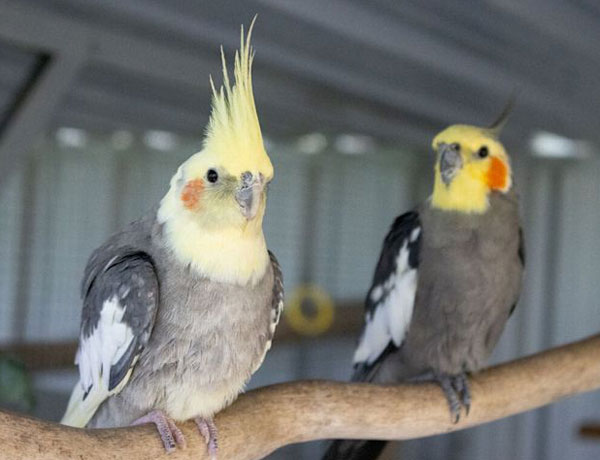
Here are solutions that might present poop eating.
1. Well-balanced diet
A cockatiel’s diet should consist of the following;
- 60% – 80% of well-formulated pellet food.
- 20% of fruits and vegetables. Examples of cockatiel-safe veggies are; broccoli, spinach, cauliflower, and spinach. Ensure you choose vegetables low in sugar but high in nutrients and minerals.
- 1-½ teaspoons of seeds and nuts per meal; choose sprouted seeds rather than non-germinated seeds
- Cuttlebone and a mineral block for mineral supplements.
Ensure you do not feed your cockatiel a diet solely of seeds. This deprives the bird of many essential nutrients. Other foods you can provide your cockatiel include;
- Peas
- Carrots
- Corn
- Boiled eggs
- Romaine lettuce
- Parsley
- Green beans
2. Mental stimulation
Accordingly, ensure your bird is not bored or lonely. You can provide the cockatiel with chewable toys made of natural materials. You can also spend time with your cockatiel playing with it or training it how to speak. Adding another cockatiel will also get rid of boredom.
Provide the cockatiel with swing sets and hanging gyms for exercising too. For foraging, sprinkle seeds or shred vegetables on a clean piece of newspaper for the cockatiel to forage through. Ensure to remove any spoiled leftovers as well.
3. Clean the cage
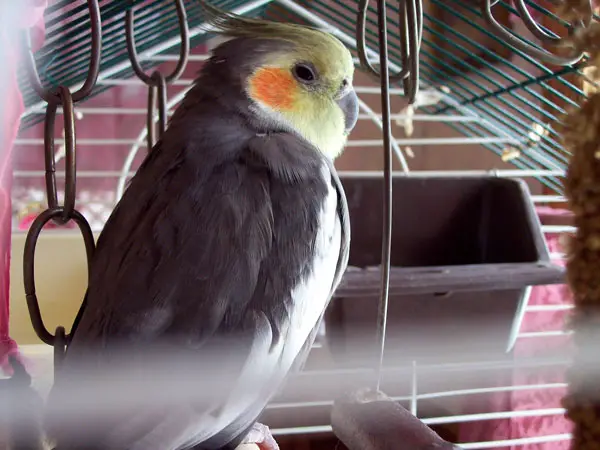
Try cleaning the cockatiel’s cage daily by doing the following;
- Replacing the cage liner
- Replacing leftover food and water with fresh ones
- Removing any droppings by sweeping
Weekly cleaning includes;
- Remove the cockatiel from its cage
- Clean the cage’s floor, bars, perches, toys, and food bowls; use hot water and cockatiel-friendly soap
- Allow the cage and its components to dry
- Replace the cage liner
4. Remove any stress triggers
If stress is making your cockatiel eat poop, ensure you remove any stressors around it. Keep the cockatiel’s cage in a calm environment. Do not yell at your cockatiel; speak to it softly.
Similarly, if you have a new cockatiel, provide it with brewer’s yeast to replenish the nutrients it loses when it poops. This will decrease your cockatiel’s instinct to eat its poop. However, consult your veterinarian before adding brewer’s yeast to your cockatiel’s diet.
What Should I Do If My Cockatiel Has Eaten Poop
You can only identify why your cockatiel is eating poop and do something about that. You can employ any of the mentioned solutions, such as providing a well-balanced diet or toys for mental nourishment.
Note that your cockatiel will not get sick from consuming its feces. The cockatiel only gets sick if it consumes feces with bacteria or if it consumes another cockatiel’s poop. Another bird could carry diseases such as psittacosis, which passes when it defecates.
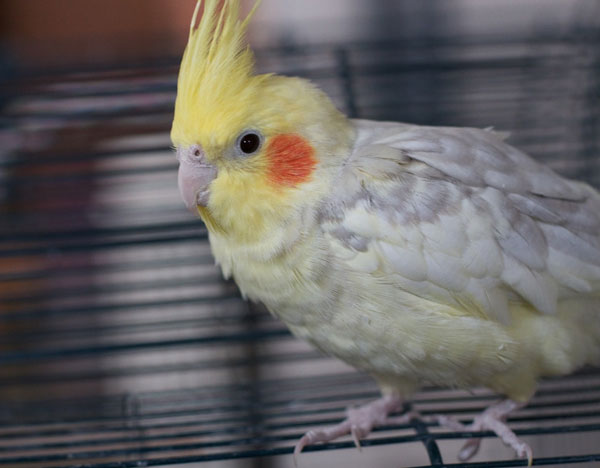
Some owners argue that they will deworm their cockatiel if it is eating poop. However, the cockatiel will still pass the feces with the harmful parasites and later eat it. This means deworming your cockatiel without taking other control measures, such as cleaning the cage, is ineffective.
So, when your cockatiel ingests the poop, it consumes the harmful bacteria hence getting critically ill. Also, a poop-eating cockatiel cannot feed well since it has a lot of poop in its stomach. Therefore, ensure you correct coprophagia as soon as you notice it.
FAQs
Here are other related questions.
Although the cockatiel might not get sick immediately, excessive poop eating has detrimental effects on its body. Also, cockatiels are not biologically built to extract the most nutrients from feces.
No, it is not normal. Birds are not genetically engineered to glean nutrients from their poop. They do it out of necessity, such as nutrient deficiency in their food.
Key Takeaways
So, why do cockatiels eat their poop? The primary reason is nutrient deficiency. So ensure your cockatiel’s diet is well formulated as discussed in the article. Eating poop is not suitable for birds. Therefore, better make sure you find out what makes your cockatiel do it and correct it.
Coprophagia is not a life-threatening situation at first, but if not addressed, it can lead to dire health issues for your cockatiel. In addition to that, clean your cockatiel’s cage so it does not do it for you. I hope this article answers all your questions about cockatiels eating poop.
